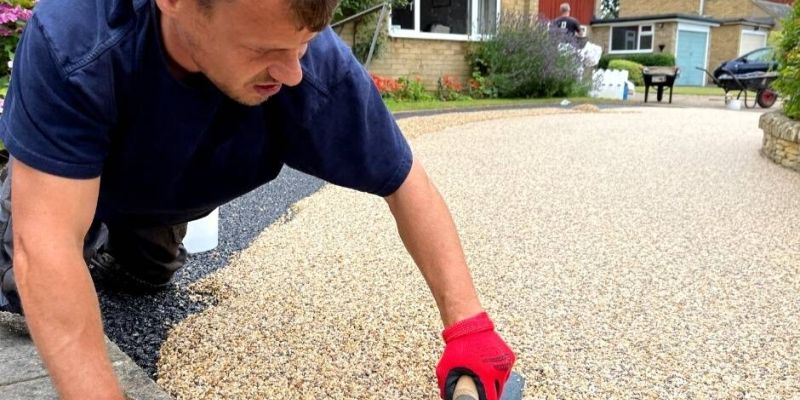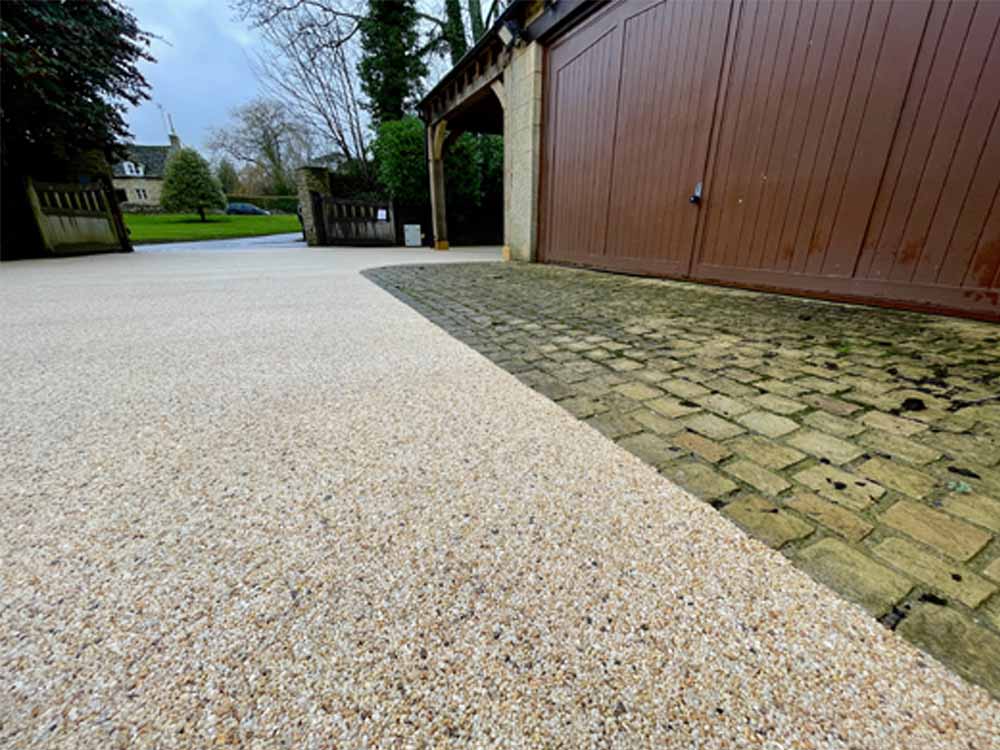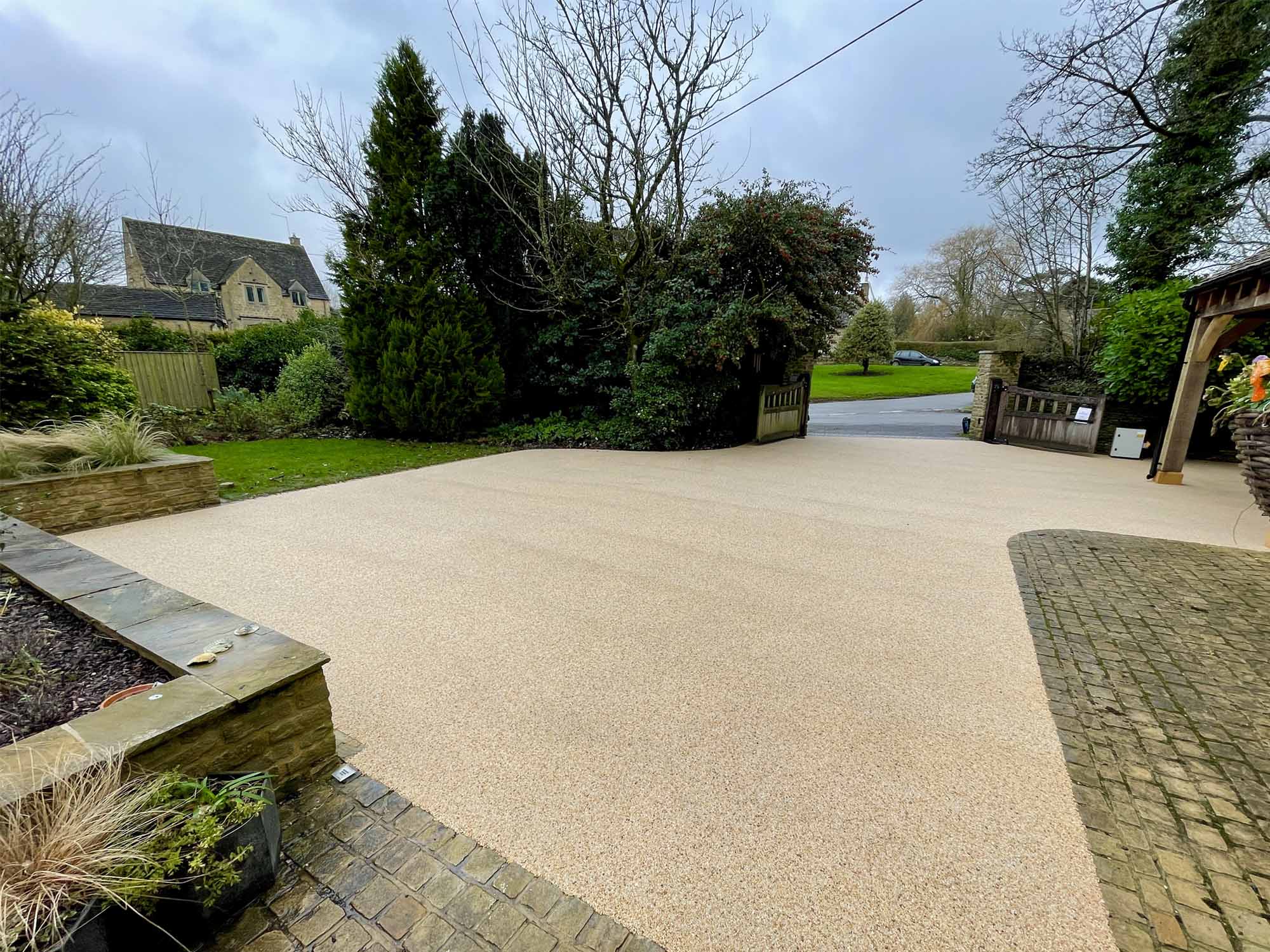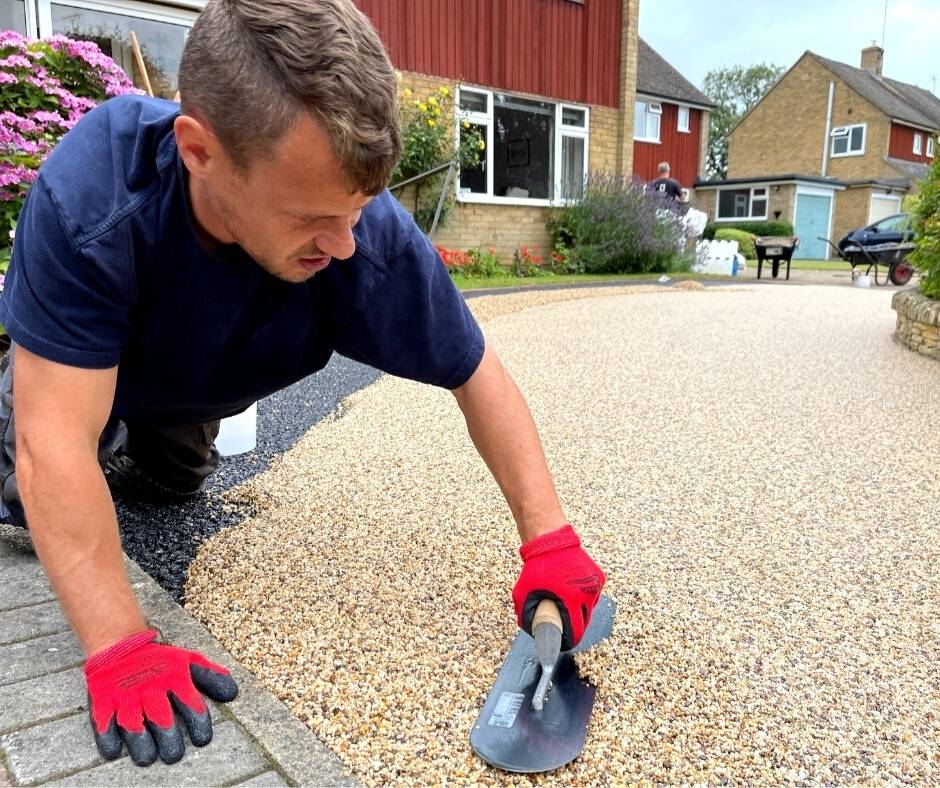
What are the pros and cons of resin-bound driveways?
Blog
Resin-bound driveways have been a popular style for many years. From their durability and functionality to their easy customisation style choices, they are one of the most popular choices for new driveways. But are they worth it?
By weighing the advantages and disadvantages, you can make an informed decision when considering this contemporary option for enhancing the appeal and practicality of your property's entrance. In this blog post, we delve into the merits and drawbacks of opting for resin-bound surfaces for your driveway.
What is a resin-bound driveway?
A resin-bound driveway is a type of driveway surface in which a mixture of clear resin and decorative dried aggregates (loose stones and materials) are combined and applied to a stable base, creating a smooth, permeable, and visually appealing finish.
So, what are the pros of resin driveways?
Resin driveways are a top choice for many people - and for many different reasons. Whether your existing surface is needing an upgrade or you're thinking about a new installation, it's a good idea to know the main benefits of these driveway materials - and why they might be the best choice for you.
Aesthetic Appeal
Resin-bound driveways stand out for their exceptional aesthetic appeal, adding a touch of sophistication and modernity to any property. The seamless finish of resin-bound surfaces creates a clean and polished look that can significantly elevate the overall appearance of your driveway.
Whether you prefer a contemporary, bold look or a more traditional, understated style, resin-bound surfaces offer a wide range of colours, textures, and aggregate options. This versatility allows you to create a driveway that complements your home's architectural style and enhances its curb appeal.
Low Maintenance
The low maintenance aspect of resin-bound driveways is a significant draw for many people who want aesthetic appeal and practicality in their driveway surface. This type of driveway requires minimal upkeep compared to traditional options, making it an attractive choice if you're a busy property owner looking for a hassle-free solution.
Weed Tackling
Unlike gravel driveways or other surfaces where weeds can easily take root between the stones or aggregates, resin-bound surfaces are weed-resistant due to their sealed finish. This means you can enjoy a consistently neat and weed-free driveway without the need for regular weeding or chemical treatments.
Easy Cleaning
Cleaning resin-bound driveways is also straightforward, further contributing to their low maintenance requirements. A simple rinse with a hose or a periodic clean with a pressure washer is usually all needed to keep the surface fresh and well-maintained. This ease of cleaning saves time and effort and ensures that your driveway retains its pristine appearance over time.
Permeability
Resin-bound surfaces are porous, allowing water to drain through the system and infiltrate the ground below. This permeability plays a crucial role in effectively managing surface water runoff and mitigating potential flooding issues on your property.
By enabling water to pass through the driveway surface instead of pooling on top, resin-bound driveways help reduce surface water runoff, particularly during heavy rainfall or stormy weather. This drainage capability aids in preventing water stagnation, which can lead to puddles, erosion, and even water damage to surrounding structures.
Planning Permission
If the resin driveway is permeable and allows water to drain through, it is less likely to require planning permission as it will likely be suds compliant. Permeable surfaces like resin-bound driveways are often preferred for their sustainable drainage benefits.
Eco-Friendly
The permeable nature of resin-bound driveways contributes to sustainable urban drainage practices by promoting natural groundwater recharge. Instead of directing excess water into storm drains or sewer systems, resin-bound surfaces facilitate the infiltration of rainwater into the soil, where it can replenish groundwater reserves and support healthy vegetation growth.
In areas prone to flooding or where water management is a concern, opting for a permeable resin-bound driveway can be a proactive solution to alleviate drainage issues and improve overall environmental sustainability.
Durability
Durability is a standout feature of resin-bound driveways, making them a popular choice for homeowners seeking a long-lasting and robust driveway surface. Resin-bound surfaces are engineered to withstand heavy use and various weather conditions without succumbing to significant wear and tear, offering a durable solution for properties looking for a reliable driveway option.
The mixture of resin and aggregates creates a solid surface that is resistant to cracking, shifting, or potholing, even under the weight of vehicles or regular foot traffic. This stability ensures that the driveway maintains its integrity over time, providing a smooth and level surface that can withstand daily wear and tear along with uv stable resin to help with the year-round weather.
But what about the cons of a resin driveway?
While resin driveways offer numerous benefits, it's essential to consider some potential drawbacks before deciding on this type of surface for your property.
- Initial Cost
One of the primary drawbacks of resin driveways is their upfront resin driveway cost. Resin-bound surfaces can be more expensive to install than traditional options like concrete or asphalt. The price can vary depending on the size of the driveway, the quality of materials used, and any additional preparation work required.
- Professional Installation
Proper installation of a resin driveway is crucial to ensure its durability and longevity. Hiring an driveway company or driveway contractors to handle the installation is essential, which can add to the overall cost. Inexperienced installation can lead to poor drainage, uneven surfaces, or premature deterioration.
- Curing Time
Resin driveways require sufficient curing time to fully set and harden. This curing process can take several hours to a few days, during which the driveway should not be used. As a result, homeowners may need to plan accordingly to avoid disruptions during the curing period.
- Potential Staining
While resin driveways are generally resistant to stains, certain substances like oil, grease, or chemicals can cause discolouration if not cleaned promptly. Regular maintenance and prompt spill cleaning are recommended to preserve the driveway's appearance. There are resin bound kits to help with cleaning but just regular jet-washing should do the trick.
Local Regulations and Permits
In some areas, installing a new driveway, including a resin-bound surface, may require planning permission. Factors such as the size of the driveway, its location, and its impact on the surroundings could influence whether permission is needed - despite resin surfaces being permeable. Checking with the local planning authority or council is advisable to determine specific requirements.
Some requirements for planning permissions come down to:
- Conservation Areas: Properties within conservation areas may have additional restrictions or guidelines regarding landscaping changes, including driveway installations. Resin-bound driveways need to align with conservation principles to preserve the area's character and environmental significance.
- Listed Buildings: If your property is a listed building or within a heritage site, special permissions may be necessary before altering the exterior, which includes installing a new driveway. Adhering to heritage and preservation guidelines is crucial to maintaining the property's integrity.
- Front Garden Regulations: Converting a front garden into a driveway, especially in urban areas, might have regulations related to green space preservation, drainage considerations, and visual impact. Resin-bound driveways should meet requirements set forth by local authorities to ensure compliance.
Environmental Standards and Guidelines
Permeability Requirement: Resin-bound driveways are often preferred because they are permeable, allowing water to drain through the surface. This feature aligns with sustainable urban drainage practices and helps reduce surface water runoff.
- Surface Water Management: Compliance with regulations related to surface water management is crucial when installing a resin-bound driveway. Proper drainage systems, rainwater harvesting solutions, and pollution prevention measures should be considered to minimise the environmental impact of the driveway installation.
- Material Sustainability: Selecting high-quality, environmentally friendly materials for resin-bound driveways can promote sustainability and reduce the project's carbon footprint.
Maintenance Considerations
If you decide that a resin-bound system is the choice for you - it is important to understand the maintenance routines to preserve its appearance, durability, and longevity.
- Regular Cleaning: Sweep the driveway regularly to remove debris, leaves, and dirt that can accumulate on the surface. Use a stiff brush or leaf blower to keep the driveway clean and prevent organic matter from decomposing and staining the resin surface.
- Avoid Harsh Chemicals: When cleaning the driveway, avoid using harsh chemicals, solvents, or de-icing salts, as these can damage the resin surface and compromise its integrity. Opt for mild detergents or specialised cleaners, which are recommended for resin-bound surfaces.
- Prompt Stain Removal: Deal with oil spills, grease, or other stains promptly to prevent them from penetrating the resin and causing discolouration. Blot the stain with a clean cloth and rinse the area with water. For stubborn stains, consult with professionals for proper removal techniques.
- Weed Control: Regularly inspect the driveway for weed growth between the aggregates. Pull out weeds by hand or use a weed killer designed explicitly for use on resin-bound surfaces to prevent weed infestation and maintain the neat appearance of the driveway.
- Avoid Sharp Objects: Avoid dragging sharp objects or heavy equipment across the driveway surface, as these can cause scratches or damage the resin-bound finish. Use protective mats under vehicles or equipment to prevent direct contact with the resin.
Final Thoughts
It's important for you to consider these factors when choosing a driveway surface, considering your budget in comparison to a resin bound driveway cost, aesthetic preferences, maintenance capabilities, and local regulations. Understanding the pros and cons of resin-bound driveways and comparing them to other options will ensure you make the right decision for you.
Ultimately, consulting with professionals, conducting thorough research, and evaluating individual circumstances can help you select the most suitable driveway surfacing option for your property. If you have any questions regarding resin bound paving that we offer - or if you would like to know more about the other driveway options we offer (from tarmac, block paving to a loose gravel driveway) please fill out the form below.



